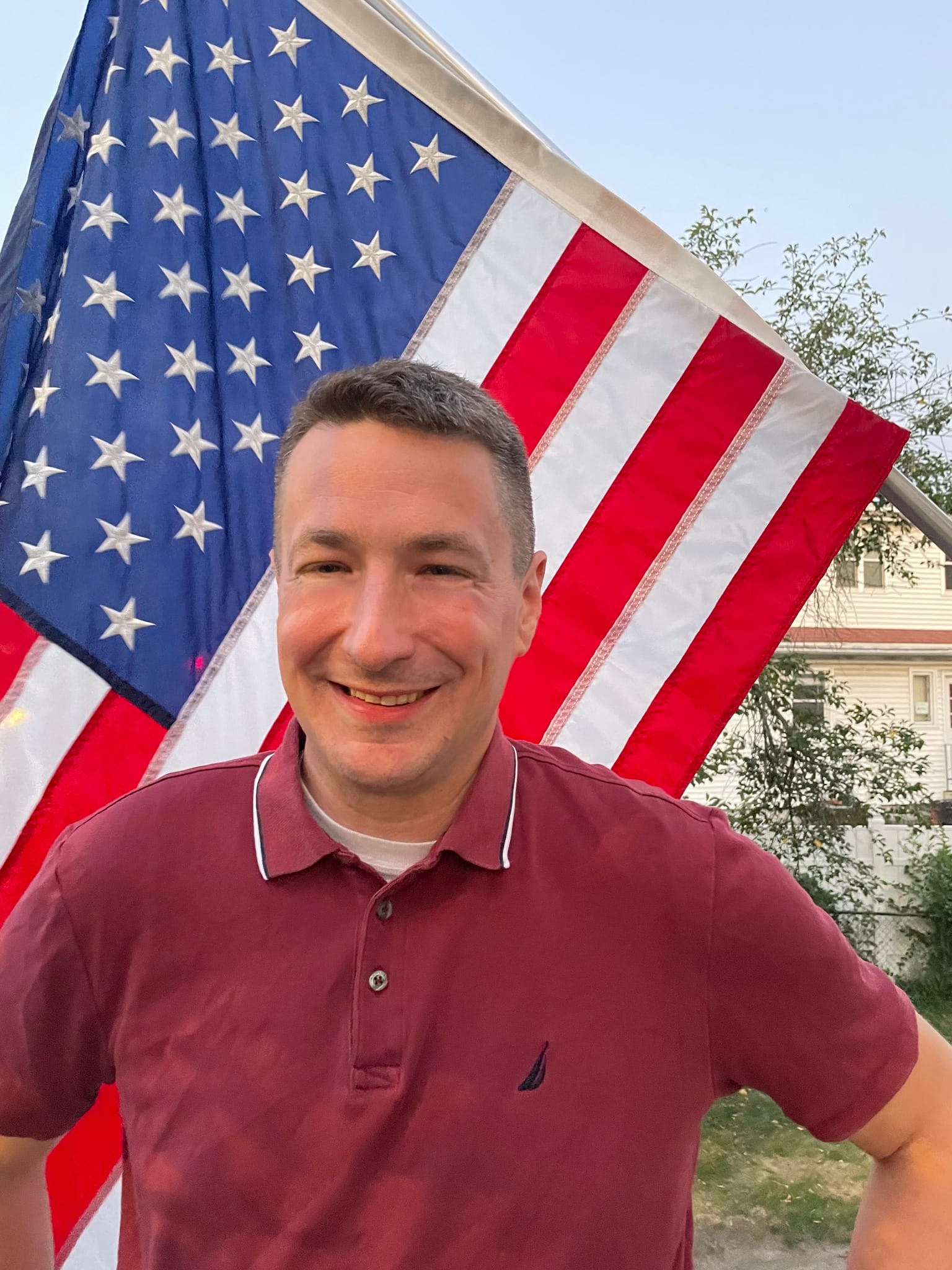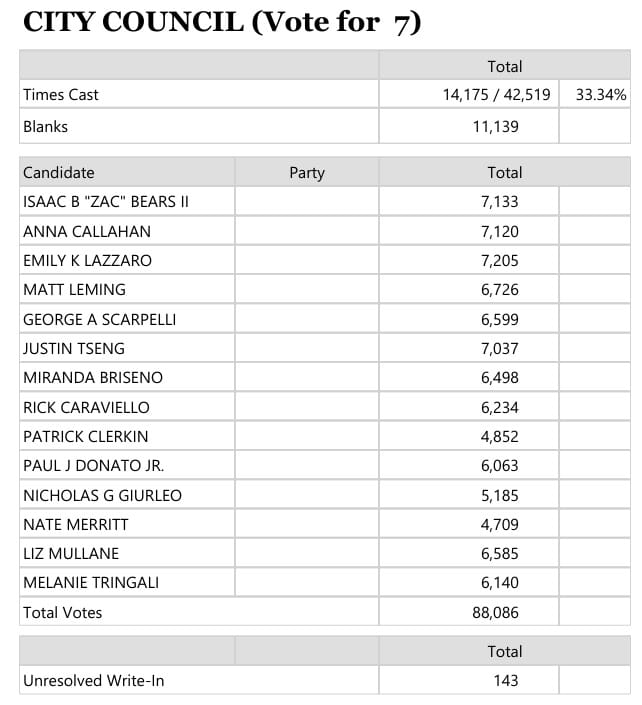Meet City Council Candidate Nate Merritt

How many years have you lived in Medford?
11 years. My wife and I bought our first home in Medford in 2014
Please describe your professional background and education.
BS and MS in electrical engineering from UMass Amherst.
MS in engineering management from Tufts University.
I’ve been working as a systems engineer and scientist since 2005 for various companies in upstate New York, eastern Mass., and southern New Hampshire. I’ve been a principal investigator, a program manager for smaller projects (less than $25M), a subject matter expert representing the US government as a contractor, and currently am a lead in product research, development, test and evaluation. My focus is on prototype system development, not production systems.
What, if any, city positions (appointed or elected) have you held, and for how long?
None
What volunteer roles have you participated in that you feel have made a difference in Medford?
I haven’t specifically volunteered in Medford, but I have volunteered in other capacities in the area. One is as a safety officer for a local airplane flying club.
Additionally, I maintain my EMT certification and have used it in passing when the need arises, thankfully not frequently.
I worked previously as a firefighter, mostly as a volunteer but also paid-call and briefly full-time paid, but not since moving to Medford (it’s all full-time here).
I have also been present at many City Council meetings over the past decade, offering perspective and potential solutions to problems over the years. The ability to donate to the fire, police, or library on your real estate tax bill was one of my ideas I presented at a meeting as a resident speaker.
Why should residents vote for you?
I’m a problem solver. As an engineer, that’s my day job.
I’ll be locally focused on Medford. Not national or state issues, but Medford. As a homeowner here for the past 11 years, and a dad to 2 young boys, I’m a stakeholder.
I have no higher political aspirations and am only in this because I think I have the knowledge, life experience, and maturity to make a positive difference to keep Medford the place I want my boys to grow up.
I’ll weigh the pros and cons of issues, not just focus on the shiny hopeful outcomes without considering the harm an action may also cause. City Council isn’t making life-or-death snap decisions like first responders have to. We can take a little time.
I don’t have a magic wand, but I hope to help get the city back to a better state of financial stability without raising everyone’s taxes in the process.
If we support and promote our commercial and industrial base instead of driving them away or sleeping on the job like we have with the AB property now handed to the MBTA, we can increase our commercial tax base and shift the burden off of residents. This will help enable us to make the infrastructure improvements we need, like fixing our roads that are in disrepair everywhere.
What do you believe are the top 3 issues currently facing the city of Medford? How do you specifically plan to address those issues?
I think they are zoning, Medford’s financial health, and the deplorable state of our infrastructure, including our roads, water and sewer, and public safety.
Most of these are the mayor’s job to solve. The role of city councilor has relatively little power in Medford due to us having a “strong-mayor” system of government.
However, I do believe a new independent look at the city’s finances by an independent auditor, not by the same firm as in previous years, is warranted, and I will advocate for that.
Historically, for the past decade, the number of end-of-year financial transfers between city departments shows that Medford could improve in its ability to budget its resources. Since this is something the City Council is directly involved in approving, I’d like to see better budgeting up front, like many residents have to in their personal spending.
Transparency and communication are vital in representative government. What steps will you or have you taken to keep your constituents informed about local decisions and to explain your voting rationale?
I come from the school of “actions speak louder than words.” I’m pretty transparent already and have made my feelings on various City Council-scoped topics known publicly through comments at City Council meetings throughout the past decade.
Social media is a tool, but it’s not the only tool. A lot of people talk in Medford. Word of mouth is very powerful. I may write articles on topics I feel strongly about and ask for them to be published.
Considering many of us have full time jobs, including myself, the best way is probably via email. It worked for me with several previous councilors, and I have already been contacted this way by constituents.
What specific methods will you use to gather and represent your constituents’ perspectives on issues that come before the City Council?
For resident-specific concerns, I would expect that people will reach out via USPS, email, phone, social media, or word of mouth.
If we’re going to get back to local focus as I plan to, I think the frequency of massively polarizing city-wide topics will be substantially reduced. Therefore the need to “ring the bell” will be less frequent, making other informational methods about topics residents should be concerned with more effective when they do arise.
The City Council currently publishes a newsletter, I will use this as a way to inform about upcoming significant topics. If we plan ahead on bigger issues, informational notices can be included in real estate and water/sewer bills, similar to how other programs currently are (example: the rain barrel offer).
For the mundane topics, I believe Medford has informational mechanisms in place, but perhaps some of these can be improved. For example with the Zoning Board of Appeals, I know there is a minimum radius from a property to inform neighbors/abutters, I lived this with the 61 Locust St. development. Perhaps this radius can be expanded at least for the informational portion.
I’d also consider publishing notices in local news. I hear a local paper called “Gotta Know Medford” is growing in popularity.
The past two years, the City Council has been updating the zoning across the city. Many residents feel the process has been too quick and has covered too much at once. What are your thoughts on that? If elected, how would you approach zoning?
I agree that the pace and scope has been overwhelming, unnecessary, and unhealthy for the city, and I have expressed concerns of this previously.
An analogy: taking a person suffering from heat stroke and throwing them in a swimming pool to rapidly cool them doesn’t help them, in fact the opposite is the result: it’s fatal.
I find the consistent lack of transparency, communication, and continued use of jargon to be disturbing for such an important issue. Arguments of “non-conformity” are misleading and confusing. The city-level maps presented didn’t compare/contrast today vs. a plan, but instead only compared various alternative plans.
Medford rushed through a rezoning of Mystic Avenue and Salem Street in the winter, giving little credence to the primary stakeholders: the residents of those areas. Many questions went unaddressed, including some of my own. No real impacts were assessed (infrastructure, public safety, schools). This was classic “cart before the horse.” I’m not a zoning expert, but I think a fundamental problem is that no clear goals have been defined. This feels like someone starting to build a house without a drawing first. “Progress” was made, but in the wrong direction.
I would start by making clear what the objectives are: X number of increased residents of types A, B, C. Y number of increased commercial businesses. Z number of additional jobs. Instead of referring to “growth” without being specific.
From there, one can perform estimates of impacts to the city’s infrastructure: schools, fire, police, roads, water and sewer, electrical grid, environmental impact. Then the city can perform a cost/benefit analysis. If the estimated impacts are too much (i.e. the costs outweigh the benefits), then the goals have to change. At the end of the day, if there is no net benefit to Medford, then the plan is not a good one, and needs to be reconsidered.
Additionally, the quality of life needs to be considered in that cost/benefit analysis. It’s not easily defined and hard to put a number to, but it’s very important and needs to be addressed. We’re talking about people’s homes and neighborhoods, for some their entire lives.
Changing Medford into Cambridge is the opposite of why people chose to come to Medford in the first place. Medford doesn’t need to “keep up with the Joneses” and has a recent history of doing so, losing its identity as a result. Instead, let’s make Medford work for the needs of Medford’s residents.
There have been City Council meetings that have gone past midnight. Do you really think these marathon meetings are serving the public? Should there be a time cap on meetings for everyone’s sake?
Short answer: No, they’re definitely not serving the public. Yes, there absolutely should be a time limit.
Having been a person over the past decade who has physically attended these meetings until the end, sometimes until near 1:30 am, it’s not productive, and negates transparency. There have been decisions (e.g. zoning amendments) made in the wee hours of the morning, literally in the “middle of the night.”
I’d like the City Council to adopt a rule that says that meetings will adjourn at 11 pm and unvoted upon issues will be tabled until the following meeting.
Additionally, the frequency of their occurrence is a huge problem. Issues that prompt people to fill City Hall should be a rarity. But recently, the frequency has increased because of focusing on international agenda-driven activism instead of local issues that affect our residents. I know for many concerned citizens, the pace has been exhausting.
The night of National Night Out in September, the council delayed discussing zoning until 11:30 pm and chose to address the “Values Ordinance,” a topic primarily focused on activism, first. People who specifically attended for zoning left to go home due to the late hour and their concerns were unheard. That’s just not right.




